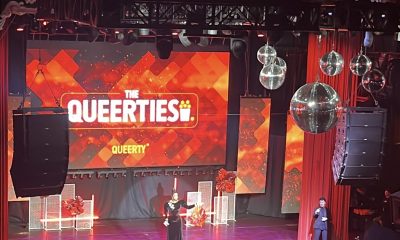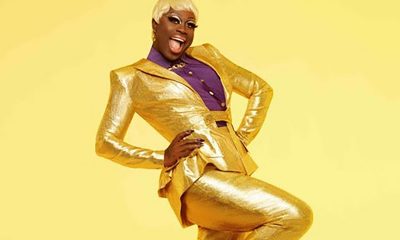Theater
Queer creator blends Shakespeare with iconic musical duo for ‘Invincible’ theatre project
“Invincible” is not the first time “Romeo and Juliet” has been deconstructed & rebuilt as a musical; apart from the obvious example of “West Side Story”
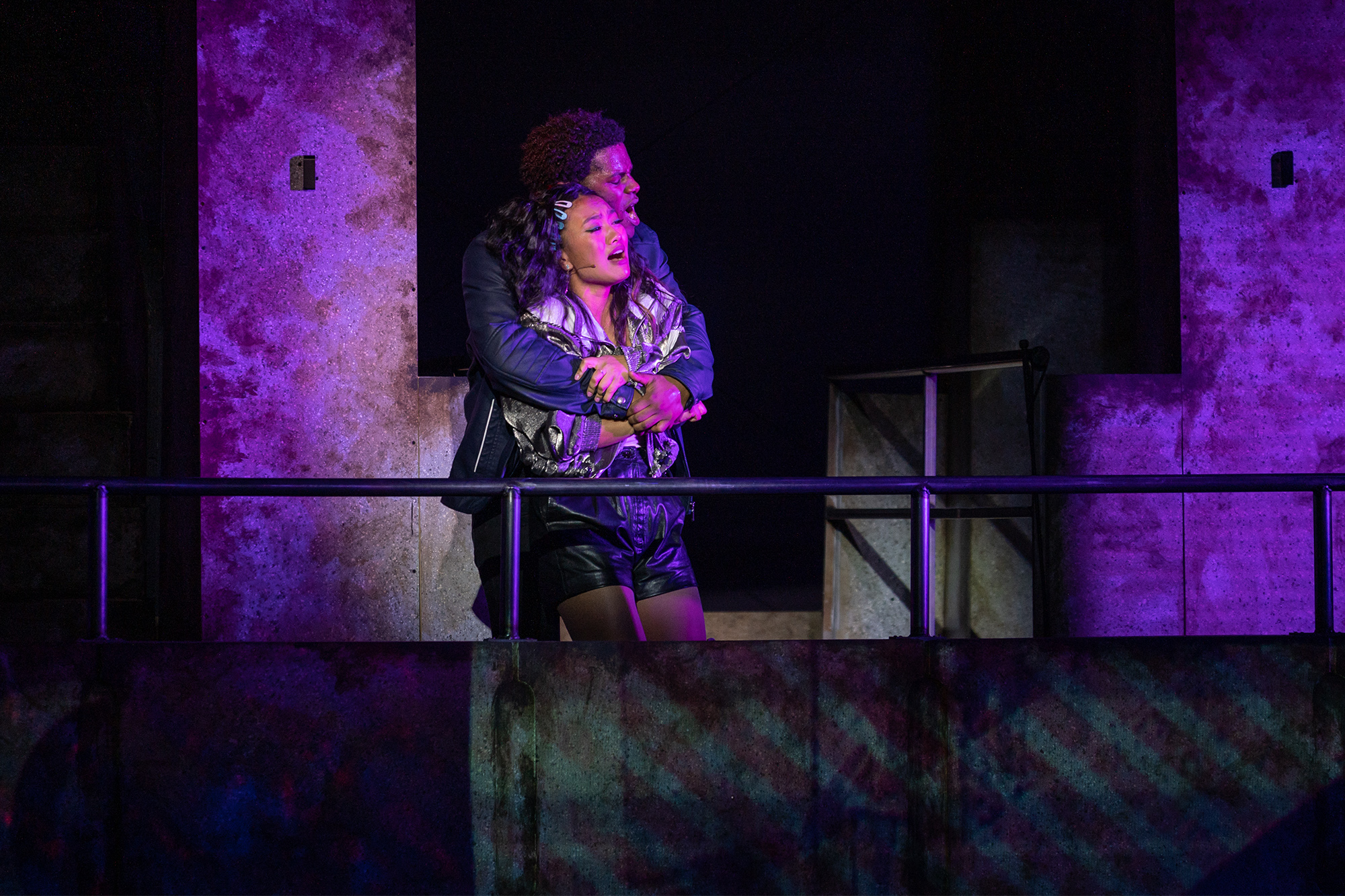
For millions of GenX-ers, the music of Pat Benatar and Neil Giraldo – Benatar’s longtime lead guitarist, collaborator, and producing partner, and her husband since 1982 – has been an iconic generational touchstone for over four decades. This might be especially true for queer GenXers, who found inspiration during their formative years in the defiant spirit that resonated through many of the duo’s songs.
One of those queer GenXers was Bradley Bredeweg, the out co-creator of another queer touchstone, television’s “The Fosters,” which became a hit for five seasons on FreeForm with its story of a lesbian couple raising five adopted children. Now, Bredeweg – a self-described “theatre kid” – is helping to bring Benatar and Giraldo’s music to a new generation of rebellious youth with “Invincible,” a new musical which intricately weaves the couples legendary catalog with inspired new songs to reimagine Shakespeare’s “Romeo and Juliet” for the 21st century.
“When I got into writing for television, I realized that I missed the equal exchange that happens between the people on the stage and the audience,” explains Bredeweg, who spoke with the Blade ahead of his show’s November 22 opening at Beverly Hills’ Wallis Center for the Performing Arts. “I love film and television, obviously, I’m so grateful for it, but after a couple of years of doing it, I was like, ‘I miss that inner theatre child, so I’m gonna moonlight.’”
The result of his “moonlighting” turns Shakespeare’s classic Verona setting into a modern, war-torn metropolis, and places his timeless tale of star-crossed lovers in a time of great transformation. Love and equality are forced to battle for survival as a newly-elected chancellor works to return the city to its traditional roots and destroy a progressive resistance that is trying to imagine peace in a divided world – and if you think that sounds familiar, it’s by design. It’s current run at the Wallis is its world premiere, but if things go as hoped, this is just the first step toward Broadway.
According to Bredeweg, however, it’s far from the beginning of his show’s journey.
“About twelve years ago, I realized I hadn’t read ‘Romeo and Juliet’ since high school and decided to read it again,” he tells us. “The next day I had to take a road trip – this was back in the era when I still had a CD book in my car – and I came across the “Best of” album of Pat Benatar and Neil Giraldo, so I popped it in and started driving. And because the story was obviously fresh in my head, I was listening to all these songs and realizing that if you line them up a certain way they totally tell the tale of ‘Romeo and Juliet.’ I wrote a first draft a couple of weeks later and then I just put it away and forgot about it.”
Much later, in 2015, he walked into a Los Feliz bar called the Rockwell (“It was this really cool kind of spot that we don’t have a lot of in LA, because we’re not a theatrical town”), where cabaret performances were sometimes mounted by visting Broadway talent and Jeff Goldblum would do a gig every Wednesday night. Inspired by the vibe, he suddenly remembered “this thing I had come up with all those years ago” and impulsively pitched the idea of putting it on to the bar’s manager. I said, ‘I’ve got this crazy idea where I want to combine Shakespeare with Pat Benatar,’ and she said, ‘That’s insane, but I’m a huge fan of your show and I love it, so let’s do it.’”
This early incarnation (then called “Love is a Battlefield”) was an unprecedented hit, enjoying a six-month run to sold out houses – that is, until Benatar and Giraldo’s manager attended a performance and recorded a video of the whole thing on his iPhone. He showed it to Benatar and Giraldo, and they were intrigued; but at the time, unbeknownst to Bredeweg, they were working on developing their own life story as a musical using their songs, so they sent a “cease and desist” letter to the Rockwell and the show was forced to shut down.
“It was heartbreaking, for all of us,” says Bredeweg, “because we knew we had something with real potential.”
Then, a year later, he got a call from a producer who told him Benatar and Giraldo wanted him to come to New York and discuss his musical.
“Of course, I said yes and got myself there immediately. We took a meeting on their tour bus, and we started talking about the musical they were developing, and suddenly we all started to move in the direction of doing ‘Love is a Battlefield.’ By the end of it we were all laughing about how we had started out with a ‘cease and desist’ order and here we were talking about coming together to do a show.”
In part, says Bredeweg, the couple was convinced to change course by their discussion of the proliferation of so-called “jukebox musicals” that have increasingly populated Broadway in recent years.
“We talked about how they have a shelf life, especially if they’re focused on a specific artist. They have a built-in audience, but beyond that, how can they stand the test of time? The real test of a timeless musical is if, in 40 years, every high school is doing it. I think that’s why we went back to using their iconic music to reinvent this epic, timeless tale.”
Another part of the appeal was how aptly the couple’s songs fit into Shakespeare’s classic – a coincidence, perhaps, but one that might be better described as synchronicity.
“When Pat and Neil met back in the late seventies it was supposed to just be a working relationship, but they fell head over heels in love with each other,” Bredeweg says. “When I got close to them, they told me they had been called the ‘Romeo and Juliet of the music world’ because the labels and managers and PR people were trying to break them up. They wanted Pat to stand on their own and Neil to just be her producing partner, and so much of what the two of them were creating at that time was about that struggle, about fighting that music industry system and saying, ‘let us figure this out for ourselves.’ That’s why so much of their music works inside of this story.”
For Bredeweg, the chance to realize his vision struck an intensely personal chord, too.
“I was always obsessed with the classics, but as a gay kid growing up in the eighties, I knew I felt different from everyone else, and as much as I loved them, I couldn’t really ‘attach’ to any character inside them. Nothing felt familiar to me, everything was from the point of view of a white cisgender person – and I always had these dreams, if I ever had any say, that I would love to tackle these classics in a different way and reposition them for a more diverse audience.”
In keeping with this mission, “Invincible” doesn’t just make Verona into a more modern city, but a more diverse one as well. The Capulet and Montague houses are run by the women, whose husbands are both dead; Romeo’s chum Benvolio is nonbinary, and falls in love with Juliet’s nurse; Juliet’s cousin Tybalt is secretly in love with her would-be husband, Paris; Paris himself is the city’s new chancellor, seeking the marriage as a means to control the vast Capulet fortune and deploy it to shore up his political power. In Bredeweg’s updated take on the tale, it’s a story about powerful men with powerful motives, with a matriarchy fighting against the traditional patriarchy and a younger generation trying to take control of its own destiny – and to ensure that it includes the freedom to love who they want.
“That’s obviously something the queer community can really understand,” says Bredweg. “We’ve been there and done that, the fight for marriage equality is all about that. It’s very much at the center of the show, and it was a big reason why I wanted to tackle the story, why I’ve rewritten so many characters with queer identities – taking these figures we thought we knew and giving them a more modern point of view.”
“Our culture is shifting in such huge ways,” he continues. “It goes back to my experience of not being able to find myself in these old tales. We are looking at our past, and pieces of art or the written world, or things in our politics, and we’re trying to reinvent these pinnacle moments in a way to make sure that history doesn’t always repeat, to move forward in different directions that are better for all of us. Especially the younger generations – they’ve stepped into this word where they’ve had no say in how chaotic things feel, and they are trying to take control of their identities and their path forward. That’s really what’s at the heart of our show.”
“Invincible” is not, of course, the first time “Romeo and Juliet” has been deconstructed and rebuilt as a musical; apart from the obvious example of “West Side Story,” the recent London import “& Juliet,” now a hot ticket on Broadway, presents an alternative version of the story in which the title character doesn’t kill herself, set to the music of pop songwriter Max Martin – responsible for hits from Britney Spears, the Backstreet Boys, NSYNC, and Céline Dion, among others.
Bredeweg isn’t worried about the competition.
“I never think about that kind of thing,” he tells us. “There’s always room for interpretation with classics of this stature. There’s space for both.”
His production, of course, has the added advantage of showcasing the music of two deeply-beloved icons whose recent induction into the Rock-and-Roll Hall of Fame has catapulted their names back into the public arena in a big way – not that they were ever very far out of it.
For Bredeweg, though, the Benatar/Giraldo connection has always been much more than just a way to make his show marketable. It’s the whole reason “Invincible” even exists.
“Pat captured my heart as a young gay kid for obvious reasons. There was something about her music, and her energy and messaging.
“It made me feel that if someone as powerful as her could exist, then I could, too.”
“Invincible” continues its run at the Wallis until December 18. For tickets and more details, visit their website.
Local
New chapter: P3 Theatre Company moves to Los Angeles
P3 Theatre Company, a long-standing staple in Long Beach’s theatre scene, has officially relocated to Los Angeles.

P3 Theatre Company, a long-standing staple in Long Beach’s theatre scene, has officially relocated to Los Angeles. While the company remains close to its Long Beach roots, this move signals a fresh chapter and opportunity to connect to a broader audience.
Jon Peterson, Executive Director and Founder of P3 Theatre Company, discusses the transition.
“After the pandemic lifted, the venue we were renting in Long Beach was no longer available to us,” explained Peterson. “After some time, we decided to look in the Greater Los Angeles area. There are so many great venues available, and there’s definitely a huge demand for the arts.”
P3 Theatre’s first major production in Los Angeles will be “Day After Day” (The Life and Music of Doris Day), a sentimental and nostalgic celebration of the legendary singer and actress. The choice to revive this show was intentional — it was P3’s last production before the Covid-19 shutdown.
“‘Day After Day ‘ was a very successful production,” said Peterson, noting that it earned Deborah Robin the Best Performer in a Musical title at the Orange County Theatre Guild Awards. “It’s such an endearing show with tons of recognizable music and the dynamic story of Doris Day.”
While dazzling performances are integral to P3’s mission, the company is equally committed to community outreach. Peterson emphasized that the move to the West Hollywood and Hollywood areas, offer opportunities to collaborate with other nonprofits and expand access to the arts for marginalized groups.
“There is a huge demand for the arts in this region,” said Peterson. “We look forward to bringing shows that audiences are excited to see, as well as introducing new works that will enhance their theatrical experience.”
One of P3’s signature initiatives is P3 Educates+, a program designed to provide performing arts workshops to underserved communities. Catering to all ages – which Peterson describes as 0-100+ – the workshops include improvisation, acting, and singing.
“It provides more than just an education of theatre,” Peterson explained. “[It provides] a level of entertainment that marginalized communities may not have an opportunity to experience otherwise.”
Supporting LGBTQ+ stories and artists is also a core priority for P3 Theatre Company. Peterson highlighted the company’s commitment to producing both new LGBTQ+ works and celebrated classics.
“Our stories need to be told and heard,” Peterson emphasized. “What better way to do so than through the arts?”
Among P3’s proudest achievements are the world premieres of two acclaimed works by playwright Jiggs Burgess. The Red Suitcase won the prestigious Del Shores Playwright Competition, while Wounded earned multiple awards at the Hollywood Fringe Festival in 2023. The latter’s success secured an off-Broadway run at Soho Playhouse in New York City, with performances continuing in 2024 and 2025.
P3 Theatre Company has ambitious long-term goals for its future in Los Angeles. Peterson hopes to build a strong audience and donor base while eventually securing a permanent performance space.
“P3 Theatre Company’s long term goal is to grow a solid audience and donor base in Los Angeles – and to find ‘the perfect theatre’ to hang our hat in.” Peterson said. “It is our plan to call Los Angeles our home and to continue to produce professional theatre in a community where theatre is thriving.”
For those eager to experience P3’s return to the stage, tickets for Day After Day (The Life and Music of Doris Day) are now available. As Peterson says with confidence, “We know the audiences will love it!”

For more information about P3, head to www.p3theatre.biz
Arts & Entertainment
GMCLA’s Rhinestone Cowboys to dazzle the stage in upcoming concert
Happening at the Saban Theatre in Beverly Hills on March 22 and March 23
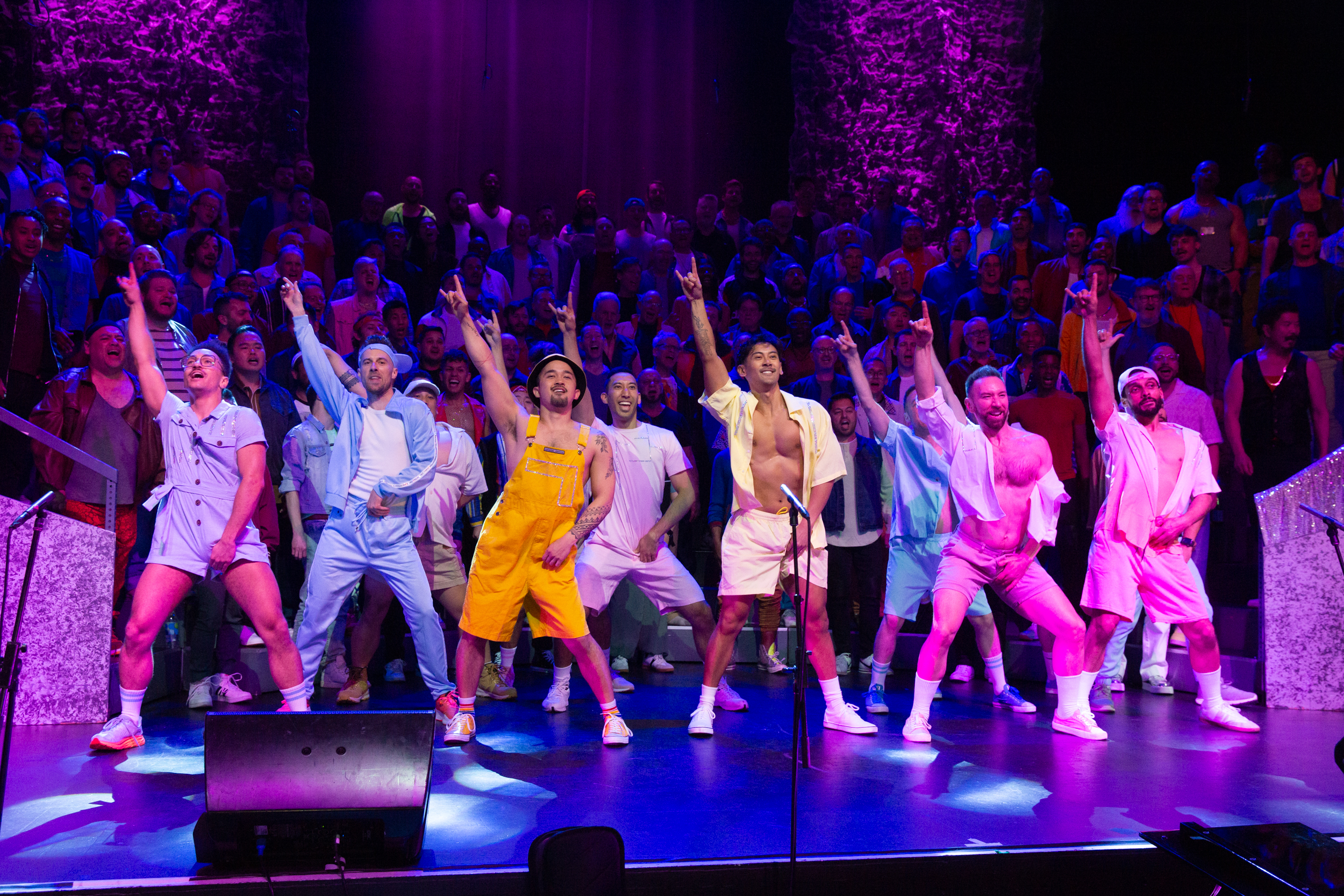
The Gay Men’s Chorus of Los Angeles is bringing the glitz and the glamour to the stage
along with 200 Chorus members dedicated toward singing and dancing to the most
revolutionary hits in country music. Not that you need one, but this is the perfect excuse
to corral the gays and gals and throw on your rhinestone-studded fits for a night of gay
magic. We know you still have the perfect articles of clothing from Beyonce’s
Renaissance Tour to make a new fit and make an appearance at the Saban.
The Rhinestone Cowboys concert will feature music by Dolly, Reba McEntire, Shania
Twain, Johnny Cash, Chris Stapleton, Taylor Swift and more.
GMCLA will also feature music by the genre’s most beloved allies and queer artists
such as Beyoncé, Brandi Carlile, Shaboozey, Lil Nas X, and Chappell Roan.
Los Angeles Blade had a chance to sit with Lou Spisto, who is the Executive Director &
Producer of GMCLA and catch up on the latest.
“Whether we do Broadway, classical, pop or disco, [the production] is going to have a
sound based on who we are and how we do what we do,” said Spisto. “It’s also going to
have our sensibility and how we sass it up and spin with just a little bit of fairy dust.”
The Rhinestone Cowboys show will feature over 200 of their over 240 members, on
stage throughout various songs – everything from the Cash classics, to the new
Beyonce hits that earned her the Grammy for Best Country Album of the Year.
Spisto was brought on as Executive Director and Producer in early 2019 after the
organization was experiencing financial trouble and began to engage the community and the organization in a fiscal turnaround by going directly to the public, even from the
stage, asking for donations from community, subscribers and the corporate sector. The
turnaround was successfully completed by the end of 2019 and months later COVID-19
forced the shutdown that all the world experienced.
Shortly after GMCLA ‘righted the ship,’ Spisto said, “COVID-19 shut us down and
thankfully, by then, we had enough financial stability to withstand what we may not have
been able to do at that time.”
“Since 2019 and then after the pandemic again, we’ve grown much stronger ,” said
Spisto. “And then COVID-19 happened before the fourth production.” Spisto credits the LA Arts Recovery Fund for giving them the critical support to keep the
organization going through the shutdown and be able to bring the Chorus back.
Four years after the pandemic shut down, Broadway and non-profit theatres are still
struggling to see pre-pandemic attendance levels. Which means, GMCLA is beating the
odds and keeping productions running during times where audience shifts, soaring
prices on everyday items and other issues, limit attendance.
According to a broader arts industry analysis, ‘the last full season before the COVID-19
industry shutdown – the 2018 to 2019 season – saw historic highs in both earnings and
artist work weeks.’ By contrast and because of COVID-19, the ‘2020 to 2021 earnings
and total work weeks dropped to a historic low.’ The latest in the analysis of 2023 to
2024 shows the nation’s theatre productions just beginning to recover from the
pandemic drop in live performances and audience attendance.
GMCLA plans upcoming productions that take over 12 weeks each to rehearse and
produce while it also performs many free community events and school programs . “We
are financially stronger, and that means we have the ability to give back to the
community as well,” said Spisto.
GMCLA recently hosted an event at The Abbey Weho that brought together the community and raised over $7,000 dollars for those who were impacted by the fires that devastated neighborhoods in Los Angeles back in January.
This is just one of the many ways that the Chorus is giving back. GMCLA continues its
work on the current season’s remaining two sets of concerts, finalizing plans for the
2025 GALA in June, creating and developing an exciting season for next year and
keeping its eyes on the 50th season in 2028 and 2029.
Arts & Entertainment
‘Old Friends’ is a must-see for Sondheim fans
Though some of the material is considered classic Broadway, it all comes off as glossy and relevant
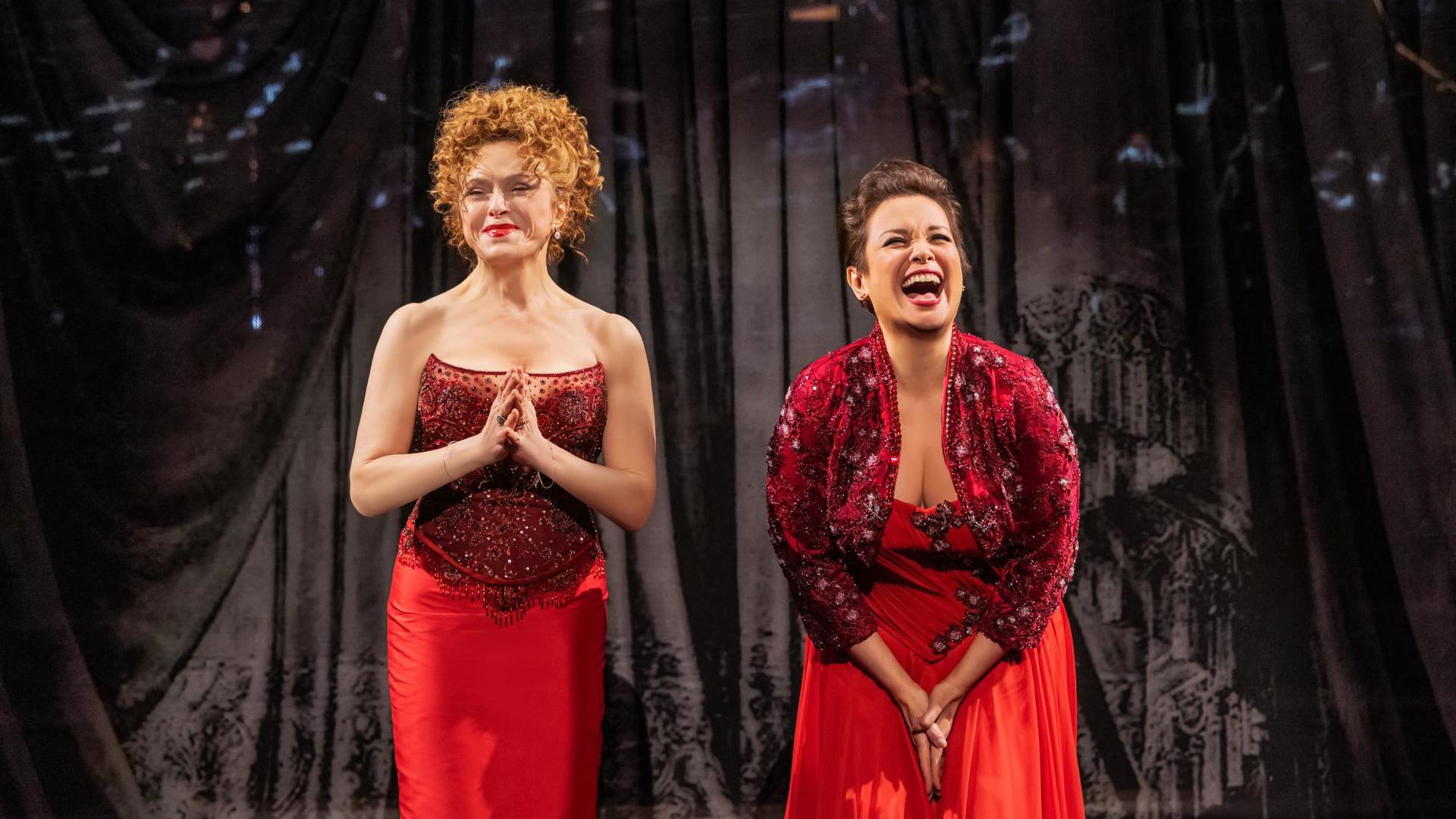
When it was announced that the Sondheim tribute Old Friends, was headed to the Ahmanson from its West End run–we the queer musical theatre nerds–went into a tizzy.
When we found out that Broadway royalty Bernadette Peters and Lea Salonga were continuing their run with the show, we just about passed out.
We were there on opening night at the Ahmanson with a star-filled audience to witness a truly five-star production where everything just fits right. The long-lasting roaring applause that met the entrance of the show’s two stars did not end and the evening took the audience on a roller coaster of emotions. This is old-school theatre excellence made fresh for today’s audience. Sondheim’s material is alive and well.
There have been musical revues of this Broadway icon before. This production fares very well by focusing on Sondheim’s collaborations with other Broadway icon Cameron Mackintosh. All of your favorites are there – Company, Into the Woods, Follies, West Side Story, Sweeney Todd, and more, with many surprises from his other shows.
Some of the musicals are presented as full sequences–and Sweeney Todd and West Side Story segments were full mini-musicals, with sets and all. Other numbers were presented with a twist, adding a fresh take that allowed the actors to shine. Though some of the material is considered classic Broadway, it all comes off as glossy and relevant.
The set, costumes, and lighting were top-notch. Quick transitions were masterfully orchestrated and the whole affair seemed made for the Ahmanson. Some traveling shows have that temporary or makeshift energy, not here. While musical theatre is often limited by budget when it comes to pit musicians, this orchestra, led by musical director Annbritt duChateau, is absolutely rich with texture and lush with sound. It gave the material the quality it deserved.
What can we say about the performers? Yes, Peters and Salonga are huge names and big personalities to lead the evening. There is not one weak player here. The cast is full of Tony Award winners and nominees–and it is obvious.
The beauty of Old Friends, is that the show gives everyone the opportunity to shine–and they take it. The chemistry of the cast is palpable and every player hands over the spotlight graciously. No one runs away with the show–they all do.
Peters, Sondheim’s main muse, continues her reign as one of Broadway’s greats. When she hits the stage, you can feel the energy and you know you are witnessing theatre royalty. Over the years her voice may have lost a little of that shine, but her emotion and pathos add a layer to the material that could never be replicated. Seeing her reprise her role as Dot in Sunday in the Park with George, is truly special.
Salonga’s voice seems to know no limits.
She skillfully masters Mrs. Lovett and brings down the curtain with her version of “Everything’s Coming Up Roses.” She may not have the emotional range as Peters, but she is the perfect lead for this show. Every other actor could have their own review, they are just that good. Special shout out to Tony Winner Beth Leavel who tore the stage apart with her take on “Ladies Who Lunch,” not an easy feat when most of us have echoes of Elaine Stritch and Patti LuPone in our minds.
She makes the material her own and the audience couldn’t get enough. Two-time Tony nominee Gavin Lee, brings the comedy and the drama to his performance, enchanting the audience with his “Could I Leave You?”
Broadway heartthrob Jacob Dickey leads a powerful and new take on “Being Alive” and also somehow makes the role of the Wolf from Into the Woods his own.
Truth be told, this winning production is best suited for Sondheim fans. I would be hesitant to take a non-theatre lover or someone who just likes movie musicals as my plus one. You don’t have to be a Sondheim aficionado, but this is a very deep dive into the material and is best appreciated by those in the know. Thank goodness there are many of us out there. What was plain to see by the audience in attendance, is how far Sondheim’s music has reached. Young, old, queer, fancy, casual, celebrity, everyone became one audience to enjoy this magical evening.
With everything going on in today’s world, it is so comforting to come home in a sense, to music that has made such an impression in our lives. There is safety in enjoying the known, like watching a TV show that you’ve binged for the umpteenth time and, in this show fraught with love and sincerity, is able to make it new again.
Old Friends plays at the Ahmanson for a limited run until March 9th before heading to Broadway. Tickets are available on the Center Theatre Group website.
Arts & Entertainment
Rogue Machine Theatre’s ‘Bacon’ probes cycles of intimacy and abuse between gay Gen Z’ers
Sophie Swithinbank’s award-winning drama about London schoolboys makes it LA debut
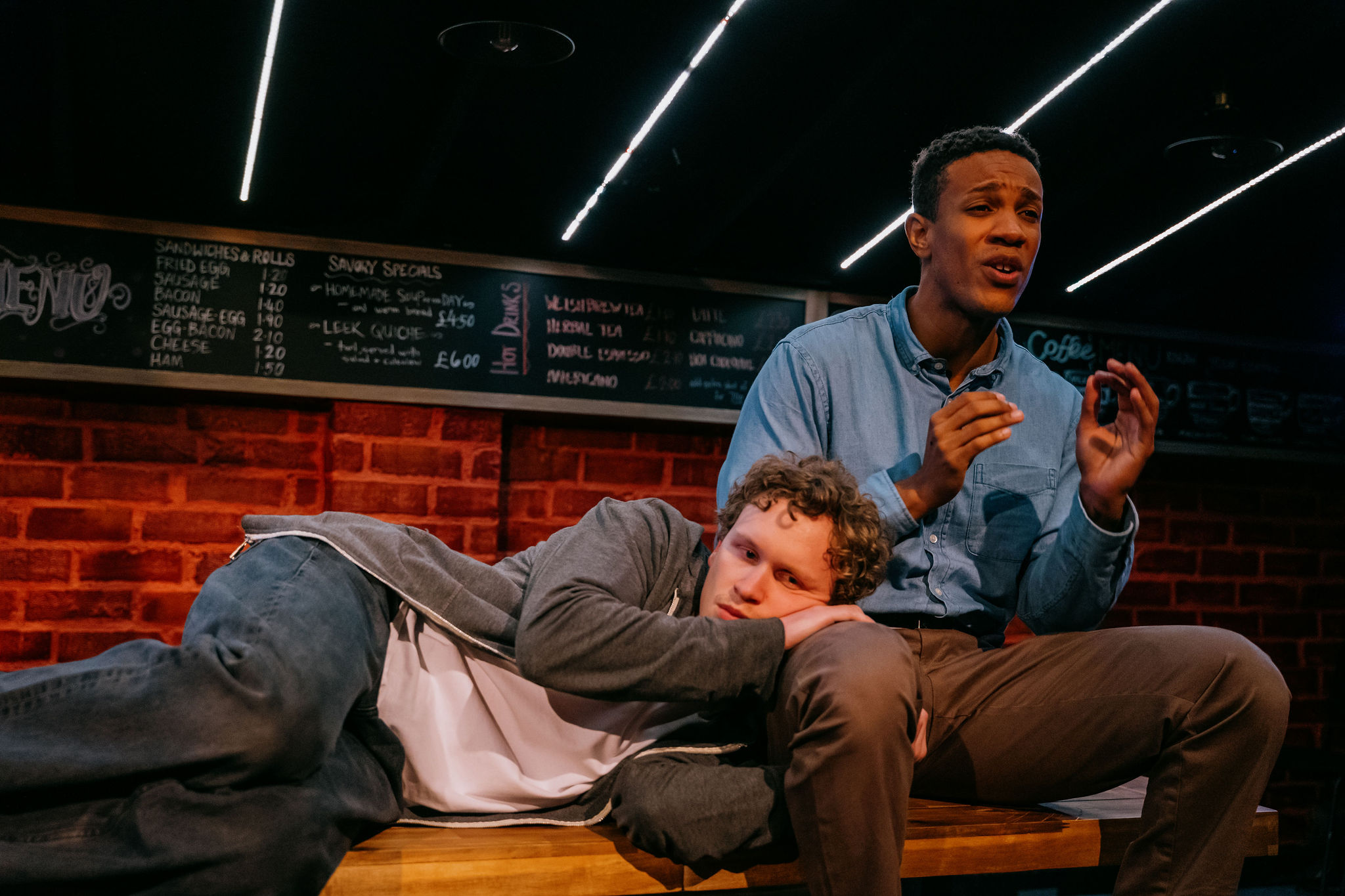
Legacies of shame and abuse play out in surprising ways in Rogue Machine Theatre’s
production of British playwright Sophie Swithinbank’s award-winning play Bacon, which follows two boys in a London high school as they form a fraught and manipulative relationship.
Rogue Machine isn’t saying much else about the play – even getting that much of log line required an email to the company’s marketing director and a referral to the play’s publisher. The company is hoping that audiences will come into the show blind and be completely surprised by what they see. So far, director Michael Matthews says the audiences who are turning up are appreciating the play’s twists and turns.
“Right before it goes to the blackout at the end of the show, there’s always a gasp, which is
always like, you got it, you’re with it,” Matthews said. “If you come see my show, I want you to
come in one way, but I want you to exit another. Even if this is a smile on your face, or like a tear or something, but to have some sort of movement. The audience is, so far from what I’ve witnessed, they’ve been along on the journey.”
Swithinbank’s own playwright’s note for the show says it’s ‘about what happens when teenagers learn to bully and humiliate each other before they learn to love,’ and that it was inspired by an act of bullying she witnessed and a toxic relationship she experienced growing up.
Matthews says when Rogue Machine approached him about directing the the play, the script gripped him from the first page, which isn’t surprising given the splash Bacon made when it debuted across the pond in 2022, earning three Off-West End Awards, and previously earning Soho Theatre’s Tony Craze Award for Playwrighting.
“It’s not just that I see myself in a play, but that my heart is pulled a certain way. That’s just me
knowing that this is something that I have to do,” Matthews said of the script.
And Swithinbank has been involved with this production as well, workshopping the script to fit it to Rogue Machine’s young cast, which features Brazilian-American actor Wesley Guimarães and Chicago native Jack Lancaster – you may have seen him on “The Bear.”
“One of actors is Brazilian, and so [Swithinbank] changed a lot of her words to add in that his
mother was Brazilian inside the play. She went so far as to put in Portuguese into the show,
which just adds on a richness that just works so beautifully. And then the other actor, his family is from Dublin, and so we changed a lot of the characterizations to have that Irish authenticity,” Matthews said.
That authenticity is essential, especially as the show is playing in Rogue Machine’s
intimate Henry Murray Stage, which seats just 37 people.
“It’s supposed to feel very intimate, like you’re walking into like some place you’re not supposed to be and you’re observing something you’re not supposed to be observing. And so you have that thing inside of you when you’re watching, like I should help. This is a foot away from me. I should do something, but you can’t, right? So it gives intimacy a whole brand new name,” Matthews said.
Bacon plays at The Matrix, 7657 Melrose Avenue, Los Angeles, CA 90046, through March 30.
Fri and Mon at 8pm, Sat-Sun at 5pm. Tickets available at The Rogue Machine Theatre site.
News
Fountain Theatre’s Alabaster presents a timely tale of love in the aftermath of disaster
‘It has this wonderful sort of straddling the fence of comedy and tragedy in the way that life does.’
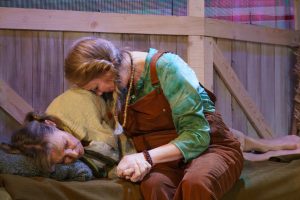
When Fountain Theatre set out to produce the Los Angeles premiere of Audrey Cefaly’s play
Alabaster, they were hoping that the all-female show about the power of art and the strength
and resilience of women would be a timely celebration of the country’s first female president.
That didn’t turn out, but in the wake of the fires that devastated Los Angeles last month, the
story – which follows a romance that blossoms when New York photographer Alice, who’s
travelled to the titular Alabama city to capture the portrait of June, a woman whose survival of a tornado has left her with physical and emotional scars – has become even more relevant.
“It’s very much a play about loss and trauma and grieving and how we process and move
forward,” says Casey Stangl, who’s directing the Fountain production. “It has this wonderful sort of straddling the fence of comedy and tragedy in the way that life does.”
And that includes the current political climate.
“On some level, it’s actually even more resonant because we don’t have [a female president]
and that’s yet another loss,” she says.
The LA fires are more than a backdrop for the theatre – they’ve directly affected the production, including delaying its opening to Feb 16. One of the actors was living in the evacuation zone, while another lived in a warning zone. Another had respiratory issues inflamed by the smoke that reached her home.
“Even once we got ourselves back in the room, we’re all still sort of dealing with that. The
physical effects, right? But also just the trauma of it,” Stangl says.
Still, all of that trauma in the room went a long way to building the emotional reality of the play – a literal use of art to process trauma through a play about using art to process trauma.
In the play, June takes up painting to deal with her own trauma, while Alice uses photography to process the trauma of others – and also as an escape from her own tragedies. But the play also explores some of the challenging moral issues around art as a sort of trauma porn.
“There’s a little bit of a dilemma for Alice, because the power dynamic is tricky. There’s an
automatic sort of unequal power dynamic between a photographer and a subject. And then
when things start to change a little bit, it’s a little bit of a thorny place to navigate ethically,” Stangl says.
Since its 2020 world premiere at the Florida Repertory Theatre, Alabaster has been produced
across the country to rave reviews. Fountain Theatre’s production has some secret weapons
that tie it to the play’s history while also invigorating it with new meaning.
Actress Carolyn Messina, who plays Weezy, one of June’s talking goats that narrate the play –
yes, it’s that kind of magical realist theatre – was part of the original production and has been
close with playwright Audrey Cefaly since high school.
And Virginia Newcomb, who plays June, actually grew up in Alabaster, Alabama, and brings a
natural authenticity to the show.
“That town is very much in her body and in her spirit,” Stangl says. “We don’t have a dialect
coach. I mean, we don’t need one. The actresses are kind of amazing. They’re just really talented and good and smart and charismatic and funny. It’s been kind of a feast in the room.”
Alabaster by Audrey Cefaly plays at the Fountain Theatre, 5060 Fountain Ave, Los Angeles,
CA, 90029 open until March 30, Fri-Sat at 8pm, Sun at 2pm. PWYC
Mondays 8pm. Tickets available at https://www.fountaintheatre.com/events/alabaster
Theater
Echo Theater’s ‘Clarkston’ finds gay love and joy at Costco
West Coast premier of hit play from “The Whale” author is Sept. 14
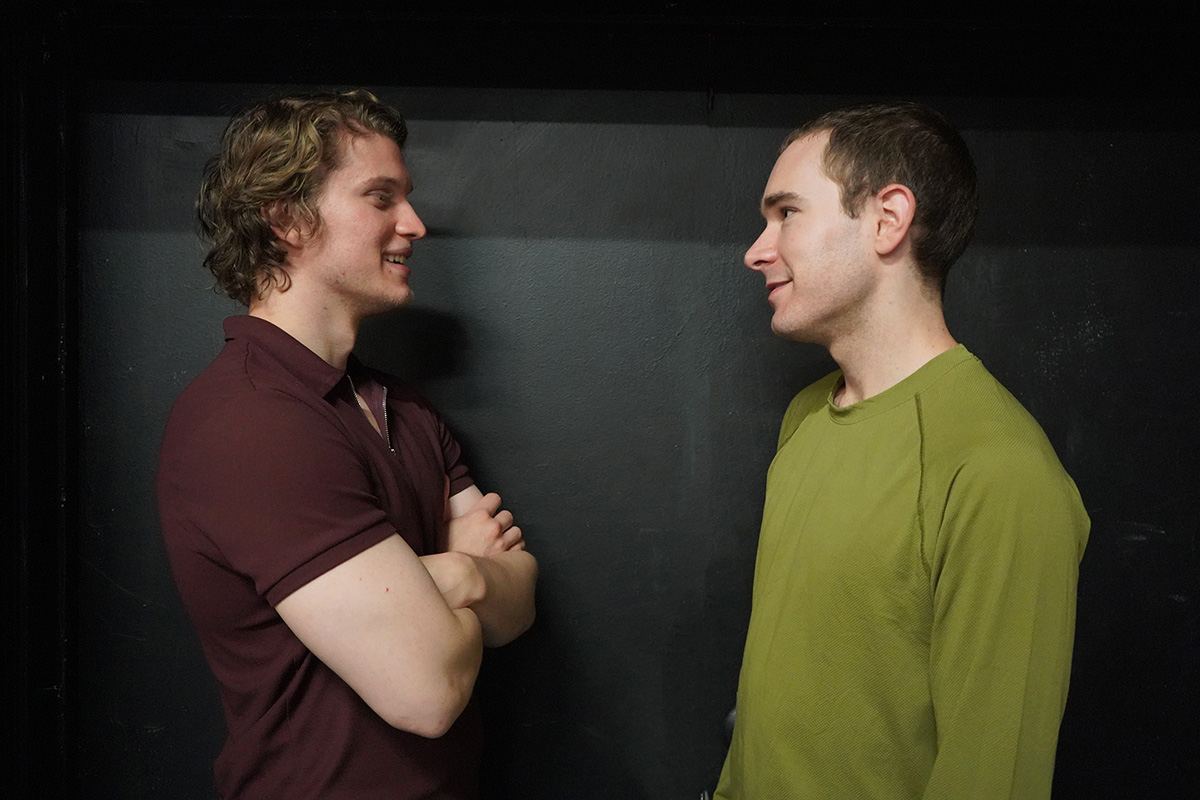
Playwright Samuel D. Hunter has long been attracted to telling stories about people that society often overlooks. So it’s fitting that his play “Clarkston,” getting its West Coast premiere this month from Los Angeles’s Echo Theater digs into the lives of two gay nightshift workers at a small town Costco.
Chris is a frustrated wannabe writer stuck taking care of his meth-addicted mom in the dead-end town of Clarkston, Wash. Jake is a distant relative of the explorer William Clark who’s fled his Connecticut hometown after receiving a fatal medical diagnosis. When they’re assigned to the same night shift in the warehouse, their mutual attraction grows into something more complicated.
For Echo Theater Artistic Director Chris Fields, who is also directing the production, “Clarkston” is a love story about how American consumerism affects our ability to connect.
“Costco for me is a very difficult place. It’s sort of about gross consumerism. You go into Costco and after five minutes, you’re like, ‘There’s nothing wrong with getting 14 steaks,’” Fields says. “I think [Hunter] puts it in there because it’s really a symbol of consumerism and alienation. Now imagine being in Costco at night under the fluorescents, moving pallets of boxes of gargantuan size.”
To prepare himself and his actors to inhabit the lives of Costco workers, Fields says he took his team to the big box store to do on-the-ground research.
“We did a field trip to Costco. We found a warehouse manager, the floor manager, and it’s like, oh, there are people that work here. And you know what? They were great. They were lovely. They couldn’t have been more charming and sweet and helpful.”
Fields says the Costco staff even gave them pallets to use on stage for that extra bit of authenticity.
“I tried to get them to give us a pallet jack, and they were like, ‘uhh …’” he says.
Hunter is best known for his play “The Whale,” which was turned into the Academy Award-winning film of the same name.
But in contrast to the often dreary and miserable tone of that play, Fields says “Clarkston” finds great joy in the lives of its protagonists.
“There’s not only joy in the play, but one of the things that makes it so emotional is these boys get to be gay with each other,” Fields says.
Playing the graveyard-shift lovers are LA Drama Critics Circle Award-winner Michael Sturgis and newcomer Sean Luc Rogers, a recent Yale graduate that Fields expects will make a big splash soon.
“I wouldn’t be surprised if in a couple years he couldn’t work with us because he’s in Vancouver shooting a series for the rest of his life,” he says.
They’re joined by Tasha Ames, fresh off her own LA Drama Critics Circle Award win for last year’s “Do You Feel Anger?”, playing Chris’s drug-addicted mom.
“They’re heartbreakers, you know? They come on stage and their hearts are open,” Fields says.
Fields hopes that despite the enormous struggles the characters are dealing with in “Clarkston,” audiences will leave feeling like there’s light at the end of the tunnel.
“You know, it’s hard. To get a car with gas that costs too much money, you can’t go out to eat anymore because it’s so expensive, we might be electing a fucking dictator in the study.
“It’s hard, and I think what I want them to come away with is that feeling when the good guys win. It can work out and it’s really kind of wonderful to be you, despite the fact that we make messes all the time,” Fields says.
‘Clarkston’ opens Sept 14 and runs Friday, Saturday, and Monday at 8 p.m., and Sunday at 4 p.m. at Atwater Village Theater, 3269 Casitas Ave., Los Angeles. Tickets are available here.
Theater
‘Happy Fall’ presents queer love story in the world of stunt acting
Rogue Artists’ production inspired by real performers’ stories
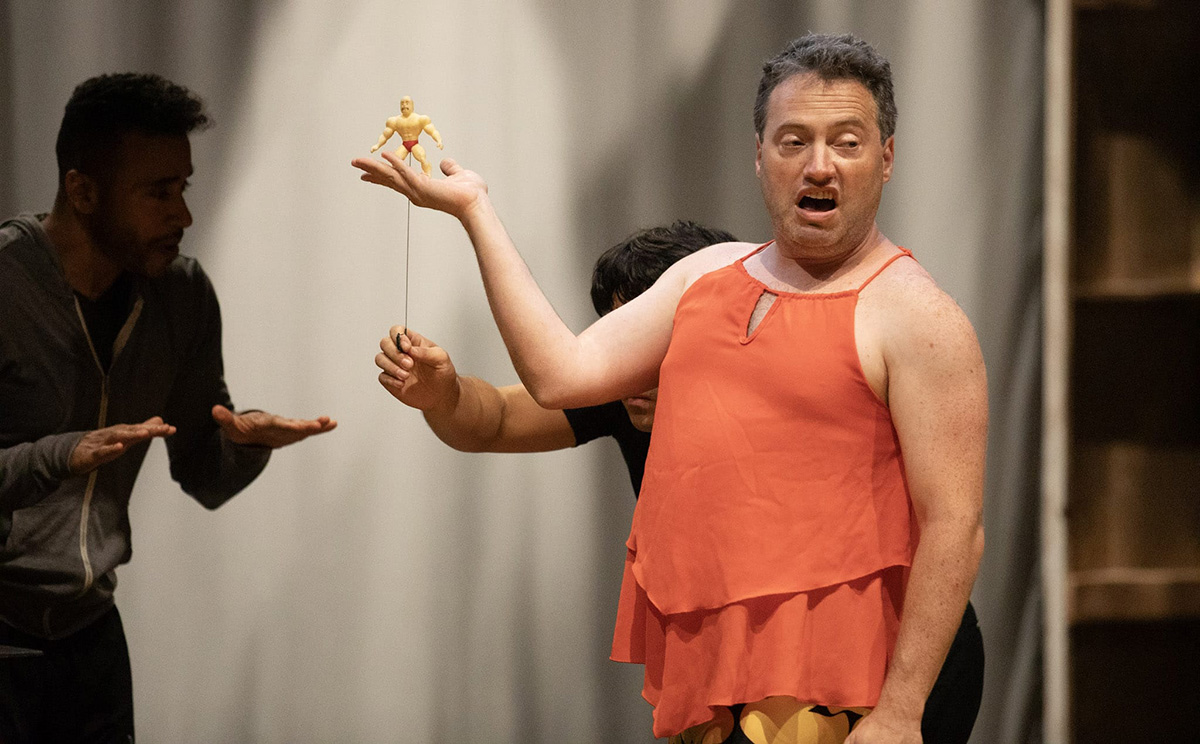
The hyper-masculine world of Hollywood stunt performers might not be the place you’d expect to find queer romance, but Rogue Artists Ensemble Artistic Director Sean Cawelti says he found the idea for his company’s new show, “Happy Fall: A Queer Stunt Spectacular,” among the real-life stories of stunt performers who had to remain closeted on the job.
Cawelti says he fell in love with the world of stunt performance by watching the live stunt shows at Universal Studios as a kid.
“I started researching the stunt community and actually found articles about stunt performers that were wrestling with their identity and their sexuality and how they were treated and mistreated in the industry because of that,” he says.
Based on his idea, Rogue Artists engaged playwright Lisa Sanaye Dring to develop a script inspired by conversations with real stunt performers in the industry.
The result is a multimedia spectacle that aspires to be a true stunt show in the vein of those old Universal Studios shows and a compelling love story about closeted performers.
“The play itself is a stunt show. It has all the things you would expect. It has audience participation, it has really amazing physical performances. And then also there are multiple camera feeds that allow us to create essentially on-the-fly cinematic experiences for the audience so that we can record things and play them back and manipulate them,” Cawelti says.
And the stunts serve as more than mere spectacle – they’re an integral part of building out the love story between aging pro Clay (played by David Ellard) and up-and-comer Felix (played by Kurt Kanazawa).
“Clay represents old school stunt world. He’s been doing this for a long time. His body is starting to get tired and is breaking down, and he loves what he does. His entire identity is baked into this notion of being this kind of invincible action hero. And he is incredibly closeted and has never been able to live fully and authentically in his life,” Cawelti says.
“And Felix, he’s new to Hollywood and is coming to the industry with a real hunger and zest, but also is living more authentically. Felix meets Clay and understands in the coded way that we often can understand that Clay is a part of Felix’s community.”
The play arrives at a timely moment, as stunt performers have been pulled increasingly into the spotlight with the recent Hollywood rom-com “The Fall Guy,” and, for Hollywood insiders, increased attention on stunt issues in the recent SAG contract negotiations and the ongoing debate about whether stunt performances and coordination should be recognized at the Academy Awards.
Cawelti thinks the increasing attention on stunt performances stems from audience disillusionment over Hollywood’s increasing reliance on CGI to sell action.
“Maybe we are fatigued with this kind of CGI superhero cartoon disembodiment that we find in cinema so much. There’s something about seeing a real person do a real thing that feels real to the eye and has a real sense of gravity,” he says.
And, of course, that sense of gravity is amplified when you’re watching real performers on a stage in front of you, a sensation that can’t truly be copied on screen.
“A live stunt show is such an oddly surreal place that makes a really exciting playground for an experience like this,” Cawelti says. “If it was on film, there’s such a distance that’s placed where we can’t actually go into the audience, we can’t actually look at you in the eyes and talk with you and ask you questions about what you’re feeling.”
To enhance that live theatrical experience, Rogue Artists is also offering a series of complementary pre- and post-show events, including talkbacks and workshops.
“We have a really exciting slate of community programming that’s complementing the performance. You can learn stunt performance, you can take a workshop on puppetry, have conversations with the composer,” Cawelti says.
“Happy Fall: A Queer Stunt Spectacular” by Rogue Artists Ensemble plays at Renberg Theatre at the Los Angeles LGBT Center, 1125 N McCadden Place, Aug. 17-Sept. 8, Thursday-Saturday at 8 p.m., Sunday at 3 p.m. Full details and tickets at rogueartists.org.
Theater
Odyssey Theatre’s Design for Living tracks an ever-shifting queer love triangle
Noel Coward’s classic comedy searches for new ways of living

Nearly 100 years before Challengers lit up screens with its teasing story of a bisexual love triangle, Noel Coward scandalized Broadway and London stages with his daring play Design for Living, that challenged norms around monogamy and sexuality with its frank portrayal of a three-way relationship. And now, Odyssey Theatre is bringing the queer classic back to the stage for a summer run from July 6-Aug 25 at the West Los Angeles venue.
Design for Living follows a trio of artists – playwright Leo, painter Otto, and designer Gilda – as they navigate an ever-shifting triangular relationship in the 1930s. It’s full of the characteristic wit that’s made Noel Coward one of the twentieth century’s most-produced comedic playwrights, but the play was considered so scandalous at the time that it the official censor of London theatre banned productions of it for six years.
Coward was inspired to write it by the open and polyamorous relationship of his longtime friends, the Broadway stars Alfred Lunt and Lynne Fontane, with whom he starred in the original Broadway production.
And while polyamory and bisexuality are hardly the taboo topics they were during the Great Depression, director Bart DeLorenzo says open and fluid relationships still challenge many people’s perceptions of propriety.
“I wouldn’t say that’s the last taboo, but it’s unusual. You see people struggling with their families and there are all sorts of heteronormative pressures,” DeLorenzo says. “I do think there are people in the world who aren’t happy themselves and don’t want other people to be happy.
“I don’t know why people want to regulate the intimate details of other people’s lives, but for some reason there’s a desire to do that. And so, I don’t think the issues of this play have really gone away.”
DeLorenzo says the play documents an important point in Coward’s life, shortly after his rise to fame, as he tries to navigate the limited opportunities he had to pursue romance and happiness as a gay man.
“He’s writing it in the 1930s, and he’s had his first bath of success, and I think he’s looking around at the world and trying to figure out what kind of life he wants to live,” De Lorenzo says. “What’s funny about the play is that he will go on to invent a kind of a new family and a new way to live, not exactly like the play but similar. But he had no idea that that’s where he was headed.”
So even though the play is a hilarious comedy, DeLorenzo says it’s still one of the most serious dramatic works Coward wrote.
“I think it’s a look for new models because there should be more choices. There should be more possibilities. And I think it really helps to have models of people who have found other ways to be happy,” he says. “It’s about trying to find a way to live the life that you want to live, even when Society doesn’t appreciate it.”
One luxury this production has over the original Broadway production – and perhaps even over modern Hollywood fare exploring polyamory – is its freedom to bring the homoerotic sides of the polyamory polygon.
“There’s a very sexy and romantic scene between the two men. It’s a very funny scene. But I think it’s a very sexy scene but between them,” DeLorenzo notes of his production. “That’s what’s interesting about the play too. Is that Coward gives the biggest scene in the play to the two men. There’s a very nice seduction of a hetero couple in the piece but in a way, I think the gay couple gets the best romantic scene.”
Design for Living plays at the Odyssey Theatre July 6-Aug 25. 2055 S. Sepulveda Blvd. Los Angeles CA 90025. Tickets $20–$37, Fridays Pay-What-You-Can. OdysseyTheatre.com
Theater
LA’s home for queer performing arts, Highways celebrates 35 years
From the AIDS crisis to today’s trans moral panic, Highways has stood at the vanguard of daring queer expression
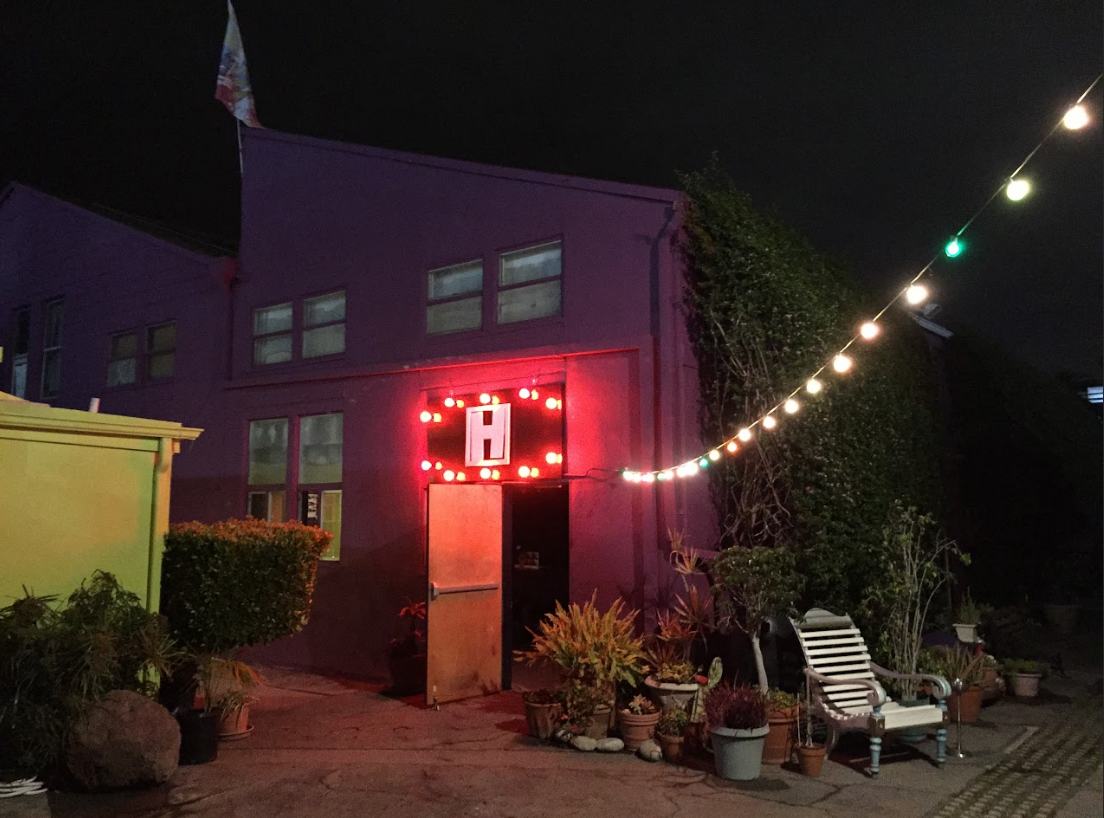
By Rob Salerno | SANTA MONICA, Calif. – For 35 years, Highways Performance Space in Santa Monica has been home to some of America’s most daring and experimental queer performing arts works.
Formed during the peak of the AIDS crisis, Highways was established as a venue where queer work, often ignored, ridiculed, or censored by mainstream arts institutions, could thrive. Given a safe space to experiment and present work that challenged social, political, and cultural norms, generations of queer artists came up through highways and have gone on to become some of the most important names in performing arts.
For Highways’ executive director Leo Garcia, that commitment to producing works that challenge the mainstream has been key to the institution’s long-term success.
“What excites me is our interest in the constant development of new works by artists who work with political, social, psychological, and personal narratives, and the hard work that we bring to make certain that the doors are open to provide access to the artists who are developing these new works and who bring their communities to our space,” Garcia says.
Highways was founded in 1989, amid intersecting crises in the LGBTQ community and the artistic communities in Los Angeles.
“The AIDS pandemic had really surfaced, and… most of the performance places closed and much of the city’s infrastructure had collapsed back then, and that had to do with real estate crunches and bureaucratic red tape and people being able to afford space so work,” Garcia says.
“There was just this recognition that we were in a crucial time politically, and at a sort of a cultural intersection where the performance art that we were creating was suited to the social-psychological-cultural climate.”
Despite the progress the LGBTQ community has made since Highways’ early days, Garcia says the organization is still presenting deeply political works that uplift the community and challenge the status quo.
As an example, he cites trans choreographer Sean Dorsey, whose dance company will headline Highways’ 35th Anniversary Party June 7-8, with a new performance called The Lost Art of Dreaming.
“The reason we’ve brought on Sean Dorsey is I feel that it’s the trans community that is really under attack in this country, and we’re just going to celebrate the beauty of a trans choreographer and their beautiful new work,” he says. “We’re also going to be honoring the Sisters of Perpetual Indulgence, who have been a part of Highways for at least two decades.”
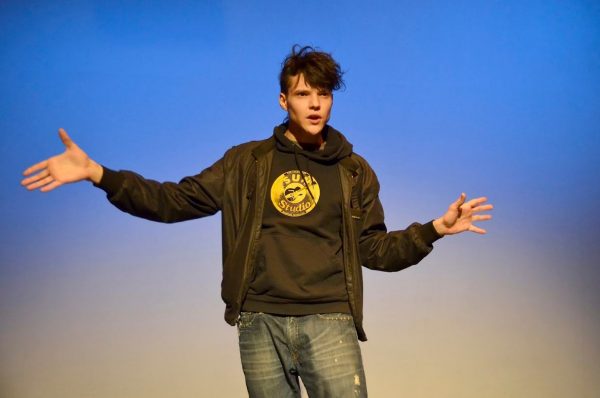
Artistic Director Patrick Kennelly says part of Highways’ success is that it’s constantly seeking out new generations of artists who keep the work fresh.
“So, there’s these different cycles, and it’s interesting now being older to see this fresher group dealing with the similar kinds of stuff that I was when I was starting out in this field 20 years ago,” he says.
Garcia became involved with Highways in 1992, just a few years after it was founded by writer Linda Frye Burnham and performance artist Tim Miller. Garcia says he had just moved to Santa Monica from New York and was just wandering around his new neighborhood when he came upon the theatre.
“There was no one at the door, and I walked in and peeked in the curtain. There were like seven people in the audience, and Annie Sprinkle was doing her show. She was inserting something into her vagina and you could go in and look inside of it. That’s the kind of work they were doing here,” Garcia recalls.
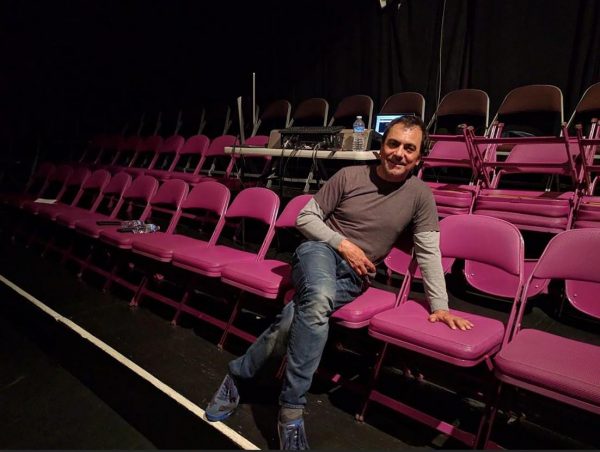
He says he started seeing shows and getting involved with the theatre, until eventually he was asked to come on board as the fiscal manager. He eventually took over as artistic director in 2003, leading the company until he handing artistic duties over to current director Patrick Kennelly.
Kennelly, who’s in his twentieth year working with Highways, first got involved as an intern while studying at CalArts. By that time, Highways had already developed a reputation for discovering and fostering important new artists.
“It was around the same time that there was a big article in the LA Times about the 15th anniversary, and there were names involved that I was familiar with from what I had been studying,” Kennelly says.
Garcia and Kennelly estimate that they’ve helped foster hundreds of artists and shows during their time at Highways – regularly hosting a new show every week, fifty weeks per year.
Over the years, Highways has also expanded its programming to include works by and for other minority and marginalized communities, while still foregrounding work by and for the LGBTQ community.
Among the many artists who’ve come through Highways are Black Lives Matter founder Patrisse Cullors, Pulitzer Prize nominee Kristina Wong, MacArthur Genius Grant recipient Luis Alfaro, and international performance artist Ron Athey. Some artists and collectives from Highways’ earliest days are still presenting works at the venue to this day, including Guillermo Gomez-Pena and the Los Angeles Poverty Department.
“What’s been exciting to me is to discover and or present early works by artists who grow into huge big entities, whether it’s touring the world with their work or getting them huge mainstream platforming,” Garcia says.
As for the future, Garcia and Kennelley say that they see Highways continuing to advance its reputation for experimenting with bold new art forms and developing important, unheard voices.
“I hope that the space can survive another 35 years and continue to support these emerging artists who are experimenting and discovering their process and maybe don’t have the accessibility at that point in their careers for larger shows,” Kennelley says.
“We want to continue to work with the communities that we’re serving and it needs to be a place of alliances and collaborations for all these different cultures and genders and disciplines,” Garcia says.
Highways’ 35th Birthday! will take place June 7-8 at 8:30pm at Highways Performance Space, 1651 18th St, Santa Monica, CA, 90404. Tickets: highwaysperformance.org
Theater
Los Angeles Drama Critics Circle announces 2023 award recipients
The 54th Annual ceremony took place on Monday, April 8, 14 different productions were honored, celebrating a wide range of LA theater
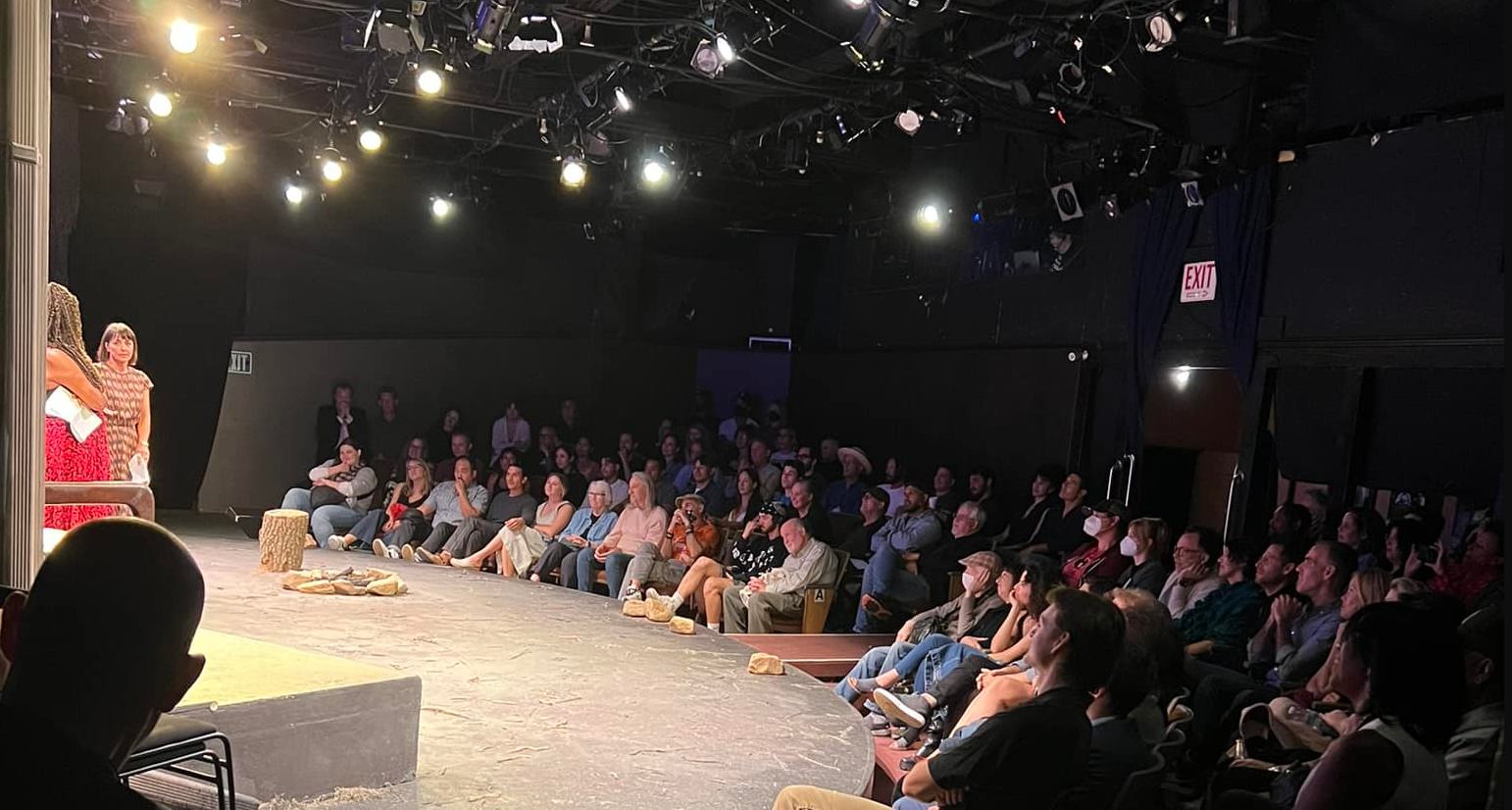
LOS ANGELES – The Los Angeles Drama Critics Circle has announced their award recipients for 2023. Kill Shelter (Theatre of NOTE) received the prestigious Production award, with additional honorees named in 17 other categories. In total, 14 different productions were honored, celebrating a wide range of Los Angeles theater.
Theatre of NOTE’s Kill Shelter and Pasadena Playhouse’s A Little Night Music received the most awards for a single production. Both productions were also factored into Special Awards, with Kill Shelter author Ashley Rose Wellman winning The TED SCHMITT AWARD for the World Premiere of an Outstanding New Play and A Little Night Music being a significant part of The JOEL HIRSCHHORN AWARD for Outstanding Achievement in Musical Theatre winner Pasadena Playhouse’s The Sondheim Celebration.
The 54th Annual ceremony took place on Monday, April 8th at 8 pm PST. For the first time in LADCC history, a presentation was live stream simulcast on both Instagram and Facebook @LADramaCritics. The live replay can still be viewed on the LADCC’s YouTube channel at @ladramacriticscircle3508 or at https://ladramacriticscircle.com/2023-awards/.
As previously announced, the LADCC has named the following Special Award Honorees:The POLLY WARFIELD AWARD for Best Season by a Small to Midsized Theater is given to Rogue Machine: John Perrin Flynn (Producing Artistic Director), Guillermo Cienfuegos (Artistic Director), Elina de Santos (Co-Artistic Director), and Justin Okin (Producing Director).
The GORDON DAVIDSON AWARD for Distinguished Contributions to the Los Angeles Theatrical Community is presented to Joseph Stern.
The JOEL HIRSCHHORN AWARD for Outstanding Achievement in Musical Theatre is presented to Pasadena Playhouse for The Sondheim Celebration.
The MILTON KATSELAS AWARD for Career or Special Achievement in Direction is presented to Michael Michetti.
The KINETIC LIGHTING AWARD for distinguished achievement in theatrical design goes to Pablo Santiago who will receive a cash prize from Kinetic Lighting (https://kineticlighting.com/).
The TED SCHMITT AWARD for the World Premiere of an Outstanding New Play is awarded to Ashley Rose Wellman for Kill Shelter (Theatre of Note). Ms. Wellman will also receive a cash prize from our Schmitt Award sponsor, The Black List (https://blcklst.com/).
The MARGARET HARFORD AWARD for Excellence in Theatre is given to Echo Theater Company, Chris Fields, Founding Artistic Director.
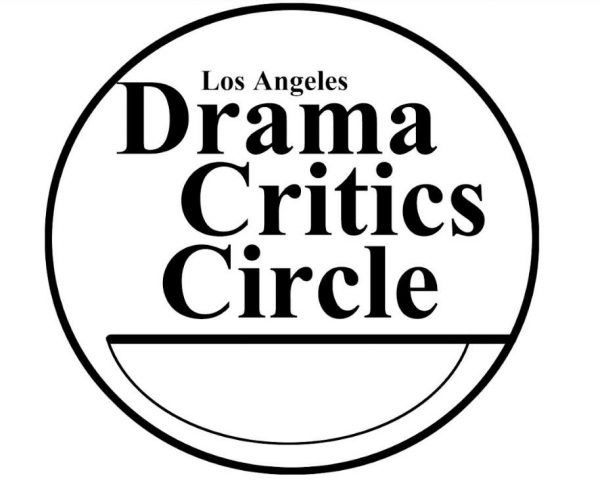
The complete list of award recipients for 2023 is as follows:
PRODUCTION
Kill Shelter; Theatre of NOTE
MCCULLOH AWARD FOR BEST REVIVAL
A Little Night Music; Pasadena Playhouse
DIRECTION
Shaina Rosenthal; Kill Shelter; Theatre of NOTE
WRITING-ORIGINAL Bernardo Cubría; Crabs in a Bucket; Echo Theater Company
Rosie Narasaki; Unrivaled; Playwrights’ Arena and Boston Court Pasadena.
WRITING-ADAPTATION
Aaron Posner; Life Sucks; Interact Theatre Company
MUSIC DIRECTION
Alby Potts; A Little Night Music; Pasadena Playhouse
CHOREOGRAPHY
Joyce Guy; Much Ado About Nothing; A Noise Within
Casey Nicholaw; Mean Girls; Hollywood Pantages Theatre
MUSIC & LYRICS
Michael Shaw Fisher; Exorcistic: The Rock Musical; Orgasmico Theatre Company
LEAD PERFORMANCE
Merle Dandridge; A Little Night Music; Pasadena Playhouse
Edwin Lee Gibson; Fetch Clay, Make Man; Center Theatre Group/Kirk Douglas Theatre
Ashley Romans; Kill Shelter; Theatre of NOTE
FEATURED PERFORMANCE
Tasha Ames; Do You Feel Anger?; Circle X Theatre Co.
Casey Smith; Do You Feel Anger?; Circle X Theatre Co.
ENSEMBLE
Life Sucks; Interact Theatre Company
SCENIC DESIGNAlexander Dodge; The Engagement Party; Geffen Playhouse
LIGHTING DESIGN
Dan Weingarten; The Tempest: An Immersive Experience; The Shakespeare Center LA and After Hours Theatre Company
COSTUME DESIGN
Kate Bergh; A Little Night Music; Pasadena Playhouse
Lou Cranch; Crabs in a Bucket; Echo Theater Company
SOUND DESIGN
Alyssa Ishii; Unrivaled; Playwrights’ Arena and Boston Court Pasadena.
SOLO PERFORMANCE
Daniel K. Isaac; Every Brilliant Thing; Geffen Playhouse
PROJECTION / ANIMATION DESIGN (was missing a comma)
Yee Eun Nam; Twilight: Los Angeles, 1992; Center Theatre Group / Mark Taper Forum
PUPPET DESIGN
Emory Royston; Kill Shelter; Theatre of NOTE
Los Angeles Drama Critics Circle (LADCC) Info: The Los Angeles Drama Critics Circle current officers consist of President Jonas Schwartz-Owen (TheaterMania, BroadwayWorld/LA), Vice President Dana Martin (Stage Raw), Treasurer Hoyt Hilsman (Cultural Daily), Co-Secretaries Martίn Hernández (Stage Raw) and Philip Brandes (Stage Raw, LA Times, Santa Barbara Independent), Website/Social Media Co-Chairs Socks Whitmore (Stage Raw) and Patrick Chavis (LA Theatre Bites, The Orange Curtain Review) and Awards Chair Tracey Paleo (Gia On The Move, BroadwayWorld/LA).
The current 2024 membership of the Los Angeles Drama Critics Circle (in alphabetical order): Lara J. Altunian (Stage Raw, L.A. Dance Chronicle), Philip Brandes (Stage Raw, LA Times, Santa Barbara Independent), Katie Buenneke (Stage Raw, TheaterDigest.substack.com), Patrick Chavis (LA Theatre Bites, The Orange Curtain Review), F. Kathleen Foley (Stage Raw), Anita W. Harris (LATheatrix.com), Martίn Hernández (Stage Raw), Hoyt Hilsman (Cultural Daily), Travis Michael Holder (TicketHoldersLA.com), Deborah Klugman (Stage Raw),
Harker Jones (BroadwayWorld/LA), Dana Martin (Stage Raw), Myron Meisel (Stage Raw), Terry Morgan (Stage Raw, ArtsBeatLA.com), Honorary Member Steven Leigh Morris (Stage Raw), Tracey Paleo (GiaOnTheMove.com/ BroadwayWorld/LA), Melinda Schupmann (ShowMag.com, ArtsInLA.com), Jonas Schwartz-Owen (TheaterMania, BroadwayWorld/LA), Don Shirley (Angeles Stage on Substack), and Socks Whitmore (Stage Raw).
Citation Totals by Production
A Little Night Music; Pasadena Playhouse; 4 wins
Kill Shelter; Theatre of NOTE; 4 wins
Life Sucks; Interact Theatre Company; 2 wins
Crabs in a Bucket; Echo Theater Company; 2 wins
Do You Feel Anger?; Circle X Theatre Co.; 2 wins
Unrivaled; Playwrights’ Arena and Boston Court; 2 wins
The Tempest: An Immersive Experience; The Shakespeare Center LA and After Hours Theatre Company; 1 win
Mean Girls; Hollywood Pantages Theatre; 1 win
Twilight: Los Angeles, 1992; Center Theatre Group / Mark Taper Forum; 1 win
Every Brilliant Thing; Geffen Playhouse; 1 win
Exorcistic: The Rock Musical; Orgasmico Theatre Company; 1 win
Fetch Clay, Make Man; Center Theatre Group/Kirk Douglas Theatre; 1 win
The Engagement Party; Geffen Playhouse; 1 win
Much Ado About Nothing; A Noise Within; 1 win
Citation Totals by Company
Pasadena Playhouse; 4 winsTheatre of NOTE; 4 wins
Center Theatre Group; 2 wins
Interact Theatre Company; 2 wins
Echo Theater Company; 2 wins
Playwrights’ Arena and Boston Court Pasadena.; 2 wins
Circle X Theatre Co.; 2 wins
Geffen Playhouse; 2 wins
The Shakespeare Center LA and After Hours Theatre Company; 1 win
Hollywood Pantages Theatre; 1 win
Orgasmico Theatre Company; 1 win
A Noise Within; 1 win
-
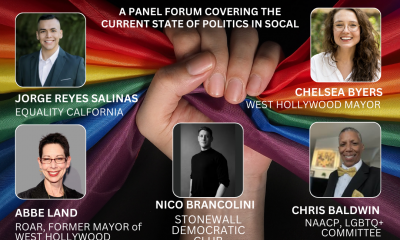
 Features4 days ago
Features4 days agoLos Angeles Blade kicks off Free Community Event Series with an informative political panel of government and advocacy group leaders
-

 a&e features2 days ago
a&e features2 days agoMusical Mondays, a mainstay in WeHo nightlife, celebrates 16 years
-

 Arts & Entertainment1 day ago
Arts & Entertainment1 day ago‘Bring it to Brunch’ returns to West Hollywood
-

 California8 hours ago
California8 hours agoSouth Park provides green space to a predominantly Latino community
-

 Myanmar1 day ago
Myanmar1 day agoLGBTQ+ advocacy group joins Myanmar earthquake relief effort
-

 a&e features1 day ago
a&e features1 day agoPeppermint thrives in the spotlight
-

 National3 hours ago
National3 hours agoLatest update in the case of wrongfully deported gay, Venezuelan make-up artist

